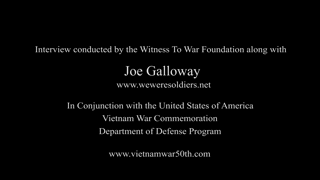6:02 | He was an ARVN advisor in the Southernmost part of the Mekong Delta. There were no American units in the area, recalls Kenneth Moorefield but he did have air support. They were so far down the supply chain that during the Tet Offensive, his unit was running out of ammunition.
Keywords : Kenneth Moorefield Vietnam counter insurgency advisor rice paddy Ca Mau Viet Cong (VC) Viet Minh delta air support Tet Offensive ammunition ammo friendly fire Swamp Joe Galloway

He wanted to be a company commander, but Kenneth Moorefield's experience as an ARVN advisor was an eye opening experience which gave him insight to the Vietnamese people and their precarious position, caught in the middle of a war. He developed great respect for his advisory unit and they became a band of brothers like any others in combat.
Kenneth Moorefield remembers two incidents from his time as an advisor to a South Vietnamese unit that gave him a sense of the complexities of that war and its effect on the people. It was a struggle that divided families and provoked deep animosity.
In Vietnam, the biggest challenge was to get the enemy to concentrate in enough numbers to be boxed in and defeated. It was an asymmetrical approach, says Kenneth Moorefield, who advised an ARVN division in the Mekong Delta. His worst days there all involved the accidental killing of civilians.
After the Tet Offensive, it was expected that the enemy would take some time to recover and launch new attacks. Not so in the Southern delta, where Kenneth Moorefield was advising a South Vietnamese unit. In the middle of a firefight, he found out first hand the effect of a high velocity round on the human body. Recovering at Walter Reed hospital, he found out that he'd left one battlefield for another.
It had always been his wish to command an infantry company and on his second tour of Vietnam, Kenneth Moorefield was put in that position. Unfortunately, the war had changed and from the top down, a new outlook that was reluctant and defensive had taken hold.
Kenneth Moorefield explains a leadership challenge he faced in Vietnam, the lack of experienced non-commissioned officers. The Army was sending men from an accelerated training program who lacked the experience, and sometimes the will, to fight a war.
After recovering from a wound he received in his second tour of Vietnam, Kenneth Moorefield was assigned to the Old Guard, the ceremonial unit at Fort Myer where they spent most of their time burying dead soldiers. He had misgivings about the way the war was fought, and now that he was back in the States, he could see and start to understand the changes in society that were affecting the military.
After two combat tours of Vietnam, Kenneth Moorefield returned as an aide to the US Ambassador. He describes the chaos of the final days of the doomed South Vietnamese government, and the desperate evacuation from the rooftop of the embassy at the end of April 1975.
Kenneth Moorefield, from the perspective of two combat tours followed by service in US embassies in the South and in the postwar North, says that he is still unsure about the value of the American engagement there. He is sure that the actions of the incoming administration in 1968 were deplorable, in light of facts that have emerged since then.
Kenneth Moorefield reflects on the experience of visiting the Vietnam Veterans Memorial and the purpose it serves. He says the upcoming fiftieth anniversary is a great time to honor those who didn't receive it when they came home.
Kenneth Moorefield came out of West Point expecting to go to Vietnam, but instead was posted to the Dominican Republic, where he underwent his first medical evacuation in the wake of a riot. He already had a sense of what he would face once he got to Vietnam from the writing of Bernard Fall.
His final service in Vietnam was not for the Army but for the State Department. Kenneth Moorefield was in Hanoi to open the US embassy and served there from 1995 to 1998. He says that the government officials who had been in combat were much easier to deal with due to their mutual respect as soldiers.